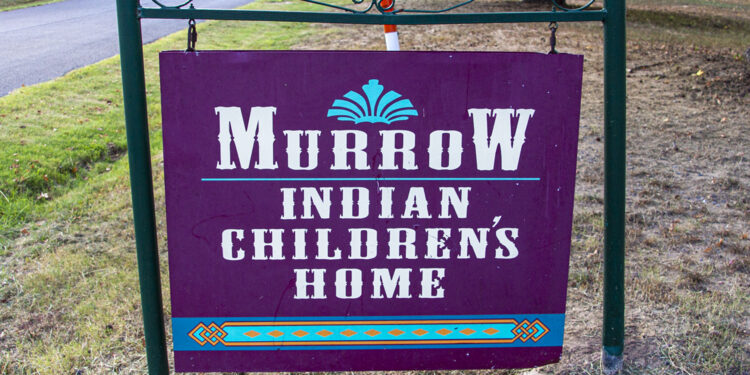“Everyone loves these children, they’re good kids, and these kids know that we love them,” said Martin. “I believe we are a good home, and we are a safe home.”
Byline: Kaylea Berry/Reporter
MUSKOGEE, Oklahoma – The Murrow Indian Children’s Home is a safe place. Indigenous children can go there under Tribal custody after being removed from their homes because of abuse or neglect. The home was founded in 1885 in Atoka, Okla., by a Baptist missionary, Rev. J.S. Murrow, and his wife. When Murrow could no longer fund the home, the American Baptist Home Mission Society took it over and moved it to the Bacone College campus in Muskogee, Okla. In the 1950s, cottages were built down the road from Bacone, where the home is today.
Their website states, “At the Murrow Indian Children’s Home, our mission is to provide a safe, nurturing environment, spiritual foundation, and cultural experience to Native American Children in crisis.”
Murrow typically houses children of school age, with the youngest being three years old. Each child is taught how to do their laundry and chores, such as setting the table and dishes and picking up after themselves. Once the children are placed into the home’s care, they are enrolled in public school, are current on medical requirements, and receive clean clothes.
The days consist of having breakfast, riding the bus to school, having an after-school snack, completing homework, attending tutoring if needed, completing their chores, having dinner together, and then getting ready for bed.
Extracurricular activities are encouraged. Staff transport children to practice and events. When not at school or participating in extracurricular activities, the children can spend their free time playing outside, watching tv, or other preferred hobbies. The staff wants the children to have as typical a home as possible.
Children can stay until they graduate high school or turn 18, whichever occurs later. However, once they moved out, they ended up homeless, incarcerated, on the streets, and clueless about being an adult. Betty Martin, Murrow Indian Children’s Home Director, recognized an issue.
Martin said, “I went to the Board of Trustees, and I said, ‘You know, I think we need to develop a transition program because I don’t feel like we’re finishing our job.'”
A new transition program was implemented, allowing children to stay in one of the cottages until they were 21. To help young adults succeed, they are taught how to purchase a car, do banking, budget, and more traits needed to become self-sufficient and live independently by 18 years old.
“One thing about those children who live at home, if they go out and fall on their face, they can go back home,” said Martin. “Our children, if they go out and don’t make it, they just don’t make it.”
When the children are 14 years old, the transition manager begins assisting in planning what they want to do and will put together a life plan for them. Their life plan typically changes by age 18, but the transition manager continues to work with them to help them accomplish their goals.
One of the current young adults living at Murrow is taking morning classes at Vo-Tech while also attending high school in the afternoon and working a part-time job. They were able to save up enough money to purchase a vehicle too.
According to Martin, the home struggles in three main areas: funding, staffing, and lawn maintenance.
Murrow Indian Children’s Home is a non-profit organization that receives funding through American Baptist Churches and individual donations, and the Muscogee (Creek) Nation and Cherokee Nation donate annually, along with other tribes donating sporadically.
While developing the transitioning program, the administration realized that more funding would be needed.
Martin said, “We realized our funding was coming for Murrow Indian Children’s Home for children under 18.”
The home started the Soaring Eagle gift shop on their grounds to help fund the transitioning program. The children make items to sell, and other vendors also have products to market. They are also looking for grants to provide funding.
Martin said that the Murrow home is currently a level B facility, like a foster home. Although, over the last few years, it has been rated a level C and even D facility because of the increase in the kids’ trauma and aggressive behaviors. Staffing is another issue because people are expected to work with happy and sweet children, not considering the abuse and neglect they dealt with.
Lastly, lawn maintenance is an issue that the home faces. A few times a year, one of the board members brings a group of workers to mow and weed-eat the property. There is no one employed as a maintenance worker.
“Everyone loves these children, they’re good kids, and these kids know that we love them,” said Martin. “I believe we are a good home, and we are a safe home.”
The gift shop will have its Christmas Open House from Nov. 10th -12th, with various products to purchase. There will be door prizes, refreshments, and gifts for the first five customers. Santa Claus will make an appearance on Saturday, and there will be live music.
Donations to the Murrow Indian Children Home can be brought to the home located at 2540 Murrow Circle, Muskogee, Okla., and or on their website. https://murrowindianchildrenshome.org/





